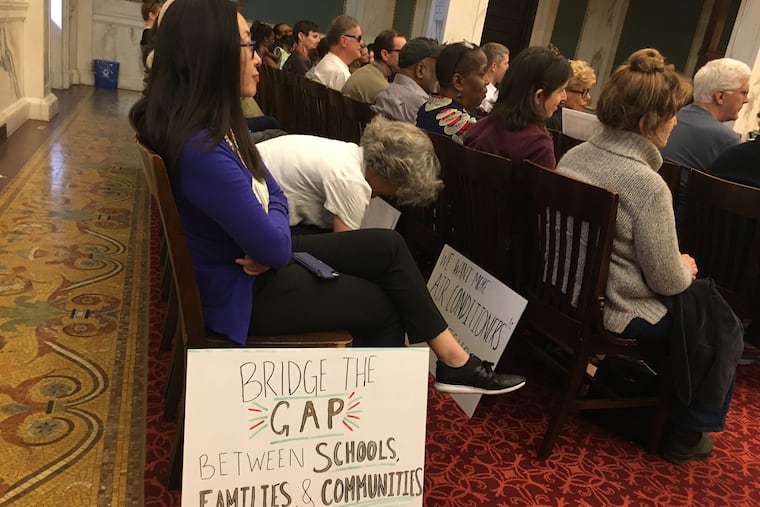End abatements, air-condition the schools, say Philly teachers, parents pushing for more education money
At a hearing Monday, parents and advocates called for investment in the district's aging facilities and supports for students, including more counselors.

After coming from Indonesia a year ago, Jason Hoo said, he was surprised by the conditions at his high school in South Philadelphia.
In addition to “nasty mold on the walls” and chipping paint, “we suffer from sitting in really cold classes in the winter and really hot classes during the summer,” Hoo, a junior at Furness High School, said Monday. “Many students refuse to take notes because their hands are so cold.”
Hoo was among the students, teachers, education advocates, and parents who spoke at a hearing convened by City Councilwoman Helen Gym to call on city leaders to steer more money to Philadelphia’s schools. About 100 people attended the hearing in Council chambers.
Many of those who spoke called for physical repairs to school buildings — $170 million to fix lead and asbestos problems that have been highlighted by The Inquirer, and to replace windows, repair leaky roofs, and pay for more cleaning services to address rodent issues found in most city schools. Other requests included doubling the current number of air-conditioning units, and playground improvements.
They also pushed for nonphysical improvements to schools — including hiring “community connectors” to serve as liaisons between schools and communities, and more counselors. Currently, one counselor can be responsible for up to 949 students, according to Maura McInerney of the Education Law Center.
While they focused on school needs rather than how the city might pay for them, a number of speakers singled out the city’s tax abatement practices as requiring change.
“We cannot afford to provide handouts to huge developers when Philadelphia is already economically prospering,” said Christina Jackson, a parent of twin kindergarten students at Henry C. Lea Elementary in West Philadelphia.
The hearing was held ahead of the School District’s budget presentation to Council next week.
“We want your voices to come first," Gym, who was joined throughout the several-hour hearing by Councilwoman Jannie L. Blackwell, said to the audience.
The 2019-20 budget plan includes more money for math assistance, nurses, and teachers for English language learners. The $3.4 billion proposal represents a 7.1 percent increase over current spending. The boost is being driven by increased payments to charter schools and salary increases in the Philadelphia Federation of Teachers’ contract.
The Board of Education is scheduled to give final approval to the spending plan later this month.
After 17 years of state governance, Philadelphia took back control of its schools last year. Funding, though, has remained a challenge — at the city and state levels. Last year, Council increased funding for schools, though it rejected a property tax increase proposed by Mayor Jim Kenney.
Meanwhile, many Pennsylvania school districts say new money they’re getting from the state doesn’t cover rising costs. The state is also being sued over school funding.
The Philadelphia School District is expecting a fund balance at the end of the coming year. But its current revenue stream isn’t predicted to cover expenses in the long term, with a $30 million deficit projected by 2022.
“Just because the district is not in fiscal turmoil does not mean the district yet has the funds, infrastructure or talent to deliver a world-class education,” Donna Cooper, director of Public Citizens for Children and Youth, said at Monday’s hearing.
Education is one of the main issues for Philadelphia voters ahead of this month’s primary election. More than half — 56 percent — of voters surveyed in a recent Inquirer poll said the city’s schools were getting worse. About one in four said they are staying the same, while 11 percent said they are getting better.
Correction: A previous version of this story misstated the size of the district’s projected budget deficit. It is $30 million, not $300 million.